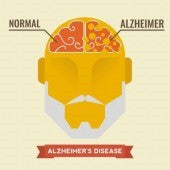One of the most frightening conditions that many people may face is Alzheimer’s disease.
Although most people associate Alzheimer’s with old age, that’s not entirely accurate. It can begin in the brain 30 years before symptoms appear, and the characteristic plaques found in the brains of Alzheimer’s patients have been detected in young adult brains.
As we age, our brain weight drops—up to 10 percent by age 80. In addition, blood flow to the brain diminishes, neurons and connections die and nerve functions slow down—all leading to reduced thinking and memory.
But on the plus side, the human brain has great reserve capacity and our brain cells can not only regenerate, but they can grow new dendrites (finger-like connections to other cells that form little electrical “pathways” for brain function)!
One disease, many causes
Although people tend to think of Alzheimer’s as a mystery, there’s nothing mysterious about it. Instead, there are a number of distinct causes and contributing factors that include the following:
Free radicals
Excessive formation of free radicals is literally toxic to your brain cells.
Genetics
Three forms of a gene called APOE plus certain other genes (known as SORL1, CLU, CR1, PICALM and TREM2) have been associated with increased risk of Alzheimer’s.
Heart disease, stroke, and high blood pressure
Heart disease, stroke, and high blood pressure are all linked to Alzheimer’s.
Decreased blood flow to the brain from these conditions is associated with the formation of the classic plaques and tangles that disrupt brain activity in Alzheimer’s.
Stress
The neurotransmitter glutamate is released when you are stressed. The right amount of glutamate helps your brain function properly, but too much (which occurs when you are chronically stressed) is harmful to your brain cells.
Type 2 diabetes
Your brain needs glucose to function properly, and when there is impaired glucose function with Type 2 diabetes, it can damage brain cells. Also, high blood sugar causes inflammation which is harmful to brain cells.
Chlamydia infection
This type of bacteria has been found in the brains of people who died of Alzheimer’s.
pylori infection
pylori in the stomach may block the absorption of vitamin B12, and since B12 is crucial to proper brain function, H. pylori can play a role in the development of Alzheimer’s.
Use of proton pump inhibitors (PPIs)
Similarly, the use of proton pump inhibitors is also linked to Alzheimer’s. These medications reduce your stomach’s production of acid which in turn impairs your ability to assimilate B12.
Herpes simplex virus HSV-1
The herpes simplex virus HSV-1 (the virus that causes cold sores) has been found to cause brain inflammation.
Nitrates in food
Researchers at Brown University have suggested that nitrates and nitrosamines damage your DNA and destroy brain cells. They may also trigger the liver to produce toxins that destroy brain cells.
Nitrates are found in processed meats like ham, bacon, lunch meat, hot dogs, and sausage.
Aluminum
For more than 30 years, it has been observed that high levels of aluminum have been found in the brains of people with Alzheimer’s.
Studies have shown that people who use aluminum cookware and use aluminum-containing antiperspirants have a higher risk for Alzheimer’s. Plus aluminum is used in certain vaccines, and since they are injected, the aluminum has access to the brain through the bloodstream.
Aspartame
Aspartame (Equal and NutraSweet) has been linked to Alzheimer’s as well as a variety of other neurological conditions.
Fight back at Alzheimer’s!
Here are 7 Sharp Brain Strategies that can help prevent, slow or in some cases even reverse cognitive decline:
Sharp Brain Strategy #1- Omega-3 essential fatty acids
A deficiency of Omega-3 EFAs makes it impossible for your cell membranes to perform their vital functions, and your brain is heavily dependent on the Omega-3 EFA Docosahexaenoic acid (DHA).
But our typical diets are severely lacking Omega-3 EFAs, so daily supplementation with these nutrients is essential!
Pharmaceutical-grade VitalMega-3 fish oil formula can ensure you have healthful levels of these crucial fats.
VitalMega-3 provides an impressive 1,200 mg of Omega-3s in every daily two-capsule serving, including 600 mg of EPA and 400 mg of DHA.
Sharp Brain Strategy #2- Antioxidants
Your brain cells are very vulnerable to free radical damage, so the protection of antioxidants is critical.
Having a diet rich in fresh fruits and vegetables is a must. In addition, Super Core multi-vitamin and mineral formula contain an effective blend of antioxidants to help counteract harmful free radicals, so it can help pinch-hit where your diet may be lacking.
Sharp Brain Strategy #3- Regular exercise
Exercise helps nourish brain cells, improves memory, reduces stress and improves mood.
The Alzheimer’s Research and Prevention Foundation states that regular exercise cuts your risk of Alzheimer’s in HALF!
Sharp Brain Strategy #4- Vitamin B12
Vitamin B12 helps your brain use carbohydrates and proteins.
It’s also essential for the production of acetylcholine--a neurotransmitter which can help you maintain clear-thinking abilities for a LIFETIME.
Unfortunately, B12 is a common deficiency, especially with people who have reduced stomach acid due to antacid use, aging or prior gastric surgery.
That’s why an oral B12 spray like Hydroxaden 2.5 can be so helpful—the B12 is sprayed under your tongue so it can be absorbed by the mucus membranes in your mouth, thereby bypassing any shortcomings in the GI tract.
Sharp Brain Strategy #5- Get quality sleep
Deep sleep and dreaming are important to supporting your brain and body functions.
Most adults should get seven to nine hours of sleep a night.
Sharp Brain Strategy #6- Reduce stress
Try exercise, yoga, prayer, meditation, music, massage, deep breathing and more. Do what works for you.
Sharp Brain Strategy #7- Carefully weigh vaccines
Carefully weigh the risks and benefits of vaccines, and if you choose to vaccinate, read the package insert in its entirety prior to injection. Neurotoxic heavy metals such as aluminum and mercury are sometimes used as adjuvants.











